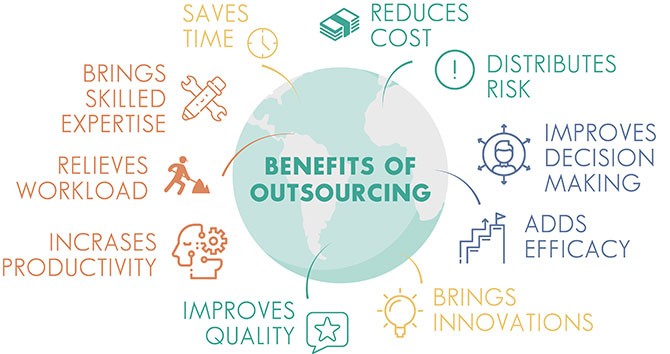What is Outsourcing? Definition, Types, Evolution
“What is outsourcing?” is a question that many people wonder when learning about this field. Outsourcing has become a pivotal strategy for businesses around the world, enabling them to streamline operations, reduce costs, and focus on core competencies. By delegating specific tasks or services to external organizations, companies can leverage specialized expertise and gain a competitive edge. But what is outsourcing, exactly? We will explore it together in this article now.
What is Outsourcing?
What is outsourcing? Outsourcing is the strategy of transferring certain business activities or services to external organizations rather than handling them internally. These external providers, often specialized in particular areas, take over tasks ranging from customer service and IT support to manufacturing and administrative functions. The primary aim of outsourcing is to allow companies to focus on their core competencies while benefiting from the efficiencies and expertise offered by third-party providers.
Historical background and evolution
The roots of outsourcing can be traced back to the Industrial Revolution when businesses began subcontracting parts of their operations to improve efficiency and reduce costs. However, it was not formally recognized as a business strategy until the late 20th century. In the 1950s and 1960s, companies focused on diversifying and broadening their corporate bases to achieve economies of scale. By the 1970s and 1980s, the trend shifted towards focusing on core business activities, leading to the rise of outsourcing as a way to increase flexibility and agility.
One significant milestone in the history of outsourcing was Eastman Kodak’s decision in 1989 to outsource its information technology systems, a move that was soon followed by many other major corporations. This period marked the transition from traditional subcontracting to strategic outsourcing partnerships aimed at enhancing business performance. That is why the question “What is outsourcing?” has emerged, as many people are still unfamiliar with or unaware of the word “outsourcing”.

Types of outsourcing
After finding the answer to the question “What is outsourcing?”. Now let’s learn about types of outsourcing. It can be broadly categorized into 3 types: domestic outsourcing, offshore outsourcing, and nearshore outsourcing. Each type offers distinct advantages and challenges depending on the company’s needs and objectives. Let’s explore it right now.
Domestic Outsourcing
Domestic outsourcing involves contracting out services to providers within the same country. For example, a New York-based company might outsource its human resources functions to a specialized firm in California. This type of outsourcing is common in sectors like IT support, marketing, and administrative services.
Domestic outsourcing offers several benefits, including reduced language and cultural barriers, similar time zones, and a better understanding of local regulations and market conditions. However, the cost savings may not be as significant compared to offshore outsourcing due to higher labor costs within the country. Additionally, the availability of specialized skills might be limited compared to a global talent pool.

Offshore Outsourcing
Offshore outsourcing involves contracting services to providers in distant countries, often with significantly lower labor costs. For example, a UK-based company might outsource its software development to a team in India or the Philippines. This approach can lead to substantial cost savings and access to a broad range of specialized skills.
However, offshore outsourcing also comes with challenges, including potential language barriers, cultural differences, and time zone discrepancies. Effective communication and project management are critical to overcoming these obstacles and ensuring successful collaboration.
Nearshore Outsourcing
Nearshore outsourcing refers to contracting services to providers in neighboring or nearby countries. For instance, a US company might outsource its IT support to a provider in Mexico or Canada. Nearshore outsourcing offers a balance of cost savings and logistical advantages, such as reduced time zone differences and cultural similarities.
This type of outsourcing is often seen as a middle ground between domestic and offshore outsourcing, providing some of the benefits of both while mitigating some of the challenges.

What is outsourcing and Why Companies Should Choose It
Businesses opt for outsourcing for various reasons, primarily driven by the need to enhance efficiency, reduce costs, and access specialized expertise. By outsourcing non-core functions, companies can focus on strategic activities that drive growth and innovation. Additionally, outsourcing provides flexibility and scalability, allowing businesses to quickly adapt to changing market conditions and demands.
Outsourcing is a dynamic and evolving strategy that continues to shape the way companies operate in the global marketplace. By understanding what is outsourcing and the different types available, businesses can make informed decisions that align with goals and maximize the potential for success.
Benefits of Outsourcing for Businesses
After exploring the concept, history, and types of outsourcing in the “What is Outsourcing?” section, let’s delve into the benefits of outsourcing. One of the primary benefits of outsourcing is cost savings. By outsourcing non-core functions to countries with lower labor costs, businesses can significantly reduce expenses. This financial flexibility enables companies to convert fixed costs into variable costs, which is crucial for managing budgets effectively. For example, outsourcing IT services to countries like India or Vietnam can result in substantial savings while maintaining high-quality service; another example is outsourcing your company’s BPO automation project to a reputable RPA solution firm that guarantees not only top-notch quality but also comprehensive support throughout the entire process, while you can spend your valuable time to focus on other important achievements.

Access to specialized skills and expertise is another major advantage of outsourcing. Companies can tap into a global talent pool, gaining access to skills and technologies that may not be available internally. This is particularly valuable for tasks requiring specific technical knowledge or industry expertise, such as software development or data analysis.
Another benefit that most businesses appreciate about outsourcing is scalability and flexibility. Businesses can quickly scale their operations in response to market demands without the need for substantial investments in infrastructure or personnel. This adaptability is crucial for companies experiencing fluctuating demand or those expanding into new markets. These are just the main benefits of outsourcing. Of course, any strategy will have its pros and cons. If you want to know the cons of outsourcing, please read this article.
If you’re ready to take your business to the next level after exploring the article “What is outsourcing?”. Let’s start by assessing your needs and identifying areas where external expertise can add the most value. Whether you’re considering domestic, offshore, or nearshore outsourcing. The key is to find the right partners, in the article “How to choose the right outsourcing company” will help you.





